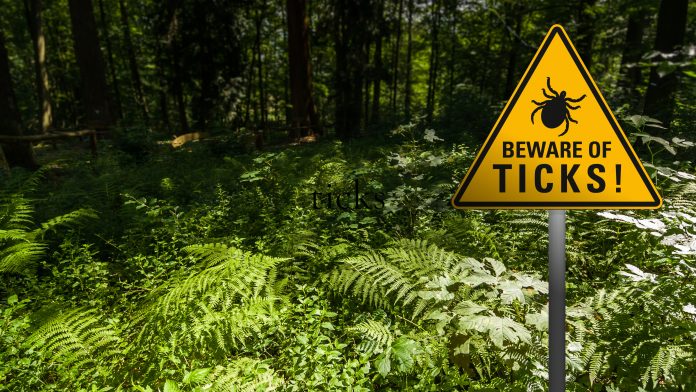While the summer months in Muskoka are bustling with locals and visitors enjoying the outdoors, the presence of ticks is something to beware of.
Ticks are becoming more common across Ontario and Simcoe Muskoka. They prefer to live in moist shaded environments, especially leafy wooded areas and overgrown grassy habitats. They are often found in and near areas with trees, shrubs, tall grass or piles of leaves.
While some tick are harmless, others may carry Lyme disease. If you are bitten by an infected black-legged tick carrying Lyme, you may become infected.
Generally, people are infected through the bite of immature ticks called nymphs that are about the size of a poppy seed. Adult ticks – about the size of a sesame seed – can also transmit Lyme disease. Ticks are very small and their bites are usually painless, so you may not know you’ve been bitten.
Lyme disease can cause serious health issues if left untreated, but you can take action to reduce your risk of a tick bite and exposure to Lyme.
The good news is, most cases of Lyme disease can be successfully treated during the early stages.
How To Prevent Tick Bites:
- Wear light coloured long-sleeved shirts and pants.
- Tuck your shirt into your pants, and your pants into your socks.
- Wear closed-toe shoes.
- Use bug spray with DEET or Icaridin.
- Walk on cleared paths or walkways.
- Wear permethrin-treated clothing.
- Shower or bathe as soon as possible after being outdoors.
- Do a full body tick check on yourself, your children, your pets and your gear after being outdoors.
- Put your clothes in the dryer on high heat for at least 10 minutes after being outdoors.
What To Do If You’ve Been Bitten By A Tick:
- Use clean fine-point tweezers to immediately remove attached ticks:
- Grasp the tick’s head as close to your skin as possible.
- Slowly pull it straight out. Try not to twist or squeeze the tick.
- If parts of the tick’s mouth break off and remain in your skin, remove them with the tweezers.
- If you can’t remove the mouthparts, leave them alone, and let your skin heal.
- Wash the bite area with soap and water or alcohol-based sanitizer.
- Contact your health care provider if you’re not feeling well or if you are concerned after being bitten by a tick.
Infected black-legged ticks can be found almost anywhere in the province. Since 2021, there have been almost 5,000 cases of Lyme disease in Ontario.
Early detection is key for avoiding Lyme disease. In most cases, if caught early, Lyme disease can be treated effectively with antibiotics.
Symptoms typically occur three to 30 days after you’ve been bitten, and they may differ from person to person.
Symptoms Of Lyme Disease:
- Early symptoms:
- Red rash (often shaped like a bull’s eye)
- Fever
- Chills
- Headache
- Fatigue
- Aching muscles and joints
- Swollen lymph nodes
- More severe symptoms (experienced weeks to months after a tick bite, if untreated):
- Severe headaches
- Facial paralysis (such as Bell’s palsy)
- Joint pain and arthritis
- Irregular heart beat and heart problems
- Nervous system disorders (such as dizziness, mental confusion or inability to think clearly, and memory loss, nerve pain, numbness or tingling in the hands or feet)
Although pets can’t spread Lyme disease directly to humans, they can carry infected ticks into your home or yard. Regular tick checks and prompt tick removal are just as important for pets as for people.








